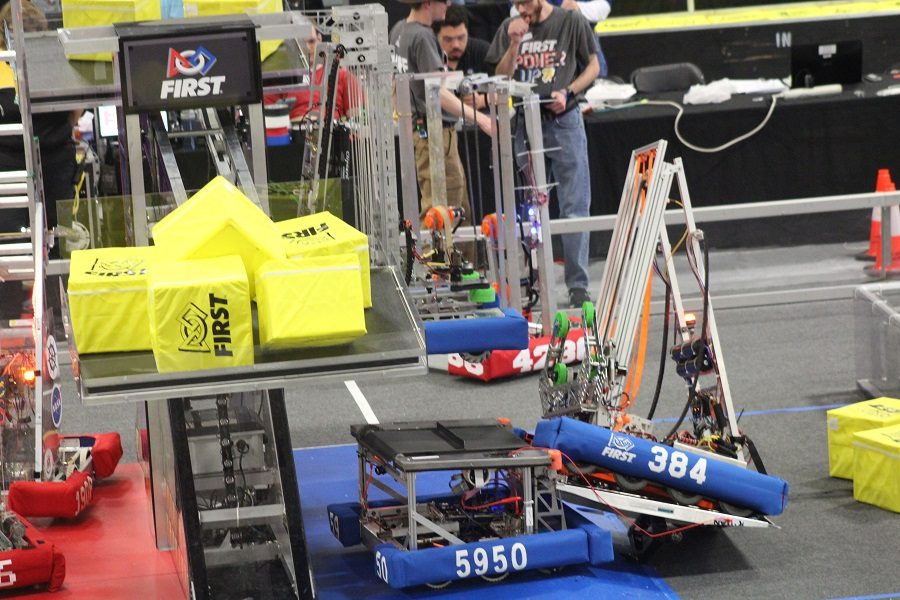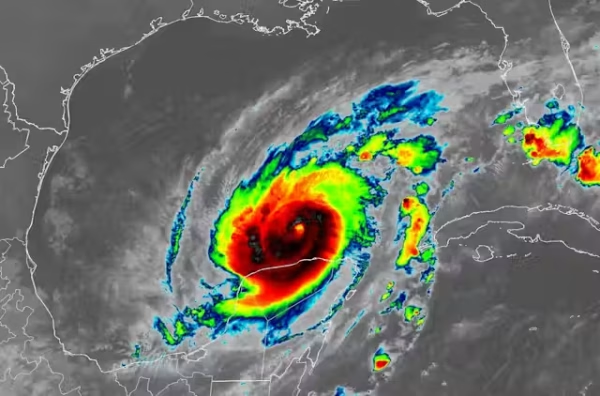Robotics Team 5950 qualifies for districts: recapping the competitions
The FIRST Robotics Competition is the ultimate sport for the mind. It is the hardest fun a person can have.
In each season of robotics, FIRST gives teams worldwide six grueling weeks to build a robot according to the new game. Last year’s game was called FIRST Steamworks, and this year, the game is FIRST Power Up, based on retro video games. In this game, teams of three place power cubes on “Switch” or “Scale.” The switch is a lever or seesaw-like mechanism that is on the ground, surrounded by an 18 ¾ inch wall. The scale is almost like the switch, but much higher off the ground and the polycarbonate wall is not there. The scale is five feet above the ground. There is a red alliance and a blue alliance, consisting of three teams each, and each alliance fights for ownership of the scale or switch. To gain ownership, the robot must place a cube in the scale or switch, and the panel must tip their favor.
There are three phases of the match: autonomous, tele-op, and end game. During autonomous, the field sends the robot a code to act upon by itself, and autonomous lasts for 15 seconds. Basically, the robot moves for 15 seconds by itself. After autonomous, the drive team is allowed to control their robot, and tele-op lasts for two minutes and 15 seconds. The phase of the game is endgame. In endgame, in the last thirty seconds of the match, the robots make their way to the platform, which is an elevated area on two sides of the scale, and the robots have two choices: climb or park. If the robot climbs, it is worth 30 points. The bar to climb, or grab hold to, is 13 inches. If a robot does not climb, they can still park, but it is worth five points if the robot parks. The robot must be above 12 inches, from its bumpers, to be consider a climb.
“That is not a lot of room up on that bar for three robots,” said head sponsor Mr. Sherlock.
Power cubes can be place in the scale, switch, or vault. Robots place power cubes in the vault to earn power ups, which give a temporary advantage in the match. The power ups are force, boost, and levitate. The force power up grants the alliance ownership of the scale, switch, or both for 10 seconds. The boost power up grants the alliance to earn double points per second of the scale, switch, or both for 10 seconds. The levitate power up gives the robot a free climb. In other words, it upgrades a robot from parking to climbing. The robots are allowed to place nine power cubes in the vault, and each cube in the vault is worth five points for a total of 45 points.
The most important points in the game are the ranking points. Ranking points sound like the name: they are points that help out with ranking. The more ranking points a team receives, the higher their position or seed among the other teams. Teams get ranking points based on three things. The first ranking point that a team can get is that all three robots cross the auto-line and take control of their switch during the autonomous phase. The second ranking point that a team can get is that all three robots climb, or two robots climb, and one robot has levitate. This ranking point is the hardest to get due to the limited amount of room on the bar.
Upon reviewing the game, Team 5950 has decided that a small, fast robot design would be the best strategy. The team’s strategy was to build a robot that can feed the vault, put cubes in the switch, and allow a robot to climb up on the ramp and raise the other robot up by 12 inches, using a scissor jack, commonly known as a car jack. The original design of the robot was to have the conveyor and the ramp one piece, but after doing some math, team members figured out that the ramp would be too steep for robots to climb onto. So, they then decided what would be best is to make the ramp and conveyor separate mechanisms, and put the ramp on the back of the robot. Thus, allowing other robots to climb us without fear of falling off. This is by the stoppers Team 5950 added on the ramp at the very end of the season.
After testing it with the Stags, Team 1262 at the Martinsville Governor’s School, MADawgs, Team 3258 at Martinsville High School, and with THS’ previous robots, the ramp was a huge success. The team even lifted their wonderful mentor, Sherlock. After all said and done, Team 5950 had finished everything that needed to be finished like the robot, Chairman award video, and the Entrepreneurship award. The only task left was to name the robot.
The robot was named after mentor Jeff Hale. The robot’s name is “El Jefe,” which means “the boss” in Spanish. “El Jefe” was then ready for the competitions.
At Deep Run High School, home of Team 1086, Blue Cheese, FIRST hosted qualifications matches for 36 teams from North Carolina, Maryland, and Virginia. Each team has 12 qualifying matches, and after the matches, teams move onto alliance selection tournament to see who has defeated the boss at the end. During alliance selection, there are eight alliance captains whose role is to pick two other teams to join the alliance. Not all teams will be picked into an alliance; instead, they will be a backup robot in case something happens to another robot. However, that is only eight teams. It still leaves four teams unpicked.
Team 5950’s first qualifying match, the autonomous programing, was not of what members expected.
“The robot just crawled to the switch,” said Jeff Hale. The program was that the robot was supposed to go 50% power, and drop the cube in the switch. During the match, the robot only went two feet and stopped. However, Team 5950 was still able to win their first match. After the first match, we immediately headed back to the pit to work on autonomous programing and double the speed. During the second match, the robot almost tipped over. It was so close. So, the team went back to work on autonomous programing yet again. They got the programing just right except for the conveyor. It would not put the cube in the switch. This was a major problem for the majority of the day. If members did not cross the auto line and put a cube in the switch, they would not be able to get a ranking point. The ranking points determine if the team goes to districts or not. Team 5950 did not get it working right until the seventh match. At the end of the first day of competitions, they finished 15th out of 36 teams ,which was good with a record of 4-4, because of bad luck and good luck.
“There was match where a robot literally fell apart on the field,” said captain Emma Hale.
“Our ramp works, it just that the other teams are not driving up the ramp straight, and there is only a limited amount of time to do it just right,” said Sherlock.
On Sunday, the following day, Team 5950 won their last three matches and got to be an alliance captain; however, they were the 8th seeded team, which means Team 5950 had to go against the first seeded team, the Stags. The Stags is Team 5950’s best friend, but also greatest rival. Team 5950 picked the MADawgs to be in their alliance. The first match was Martinsville High and Tunstall High, versus Martinsville Governor’s School. It was a good match, despite losing, but only by 13 points. At the end of the day, the sixth seeded team won and defeated the Stags. Team 5950 did not win any awards but they held their heads high, knowing that they finished with an 8-4 record, placing 12th among the teams. After all was said and done, Team 5950 was ready for the next competition at Churchland High School.
During the second weekend of competitions at Churchland High School, Team 5950 had a string of bad luck for both days at competitions. They either had a team to not show up, or one of our alliance members gave the other alliance 150 points in penalties, despite Team 5950’s autonomous programing working. THS finished 24th among the other 36 teams with a record of 5-7. After qualifications matches, it was time to pick alliances. It got down to the number one seed and each one of the Team 5950 members had everything crossed, hoping that we would get picked.
“We would like to invite Team 5950 to join our alliance,” said the first seeded alliance captain. After Team 5950 celebrated, they quickly got ready for the match. THS won the first playoff match, but lost the second due to the robot hitting another robot. However, it did not end all sad. At the award ceremony, Team 5950 won the entrepreneurship award.
On March, 25, Team 5950 finally got news that members wanted to hear: Team 5950 qualified for districts. The Robotics Club is leaving for Maryland on Wednesday, March 28, and will be staying until March 31 for districts and a chance to make worlds.
Your donation will support the student journalists of Tunstall High School. Your contribution will allow us to purchase equipment and cover our annual website hosting costs.

Timothy Hill is a senior. This is his first year in journalism. He loves to play soccer and help build robots for the THS Robotics Club. He is planning...








